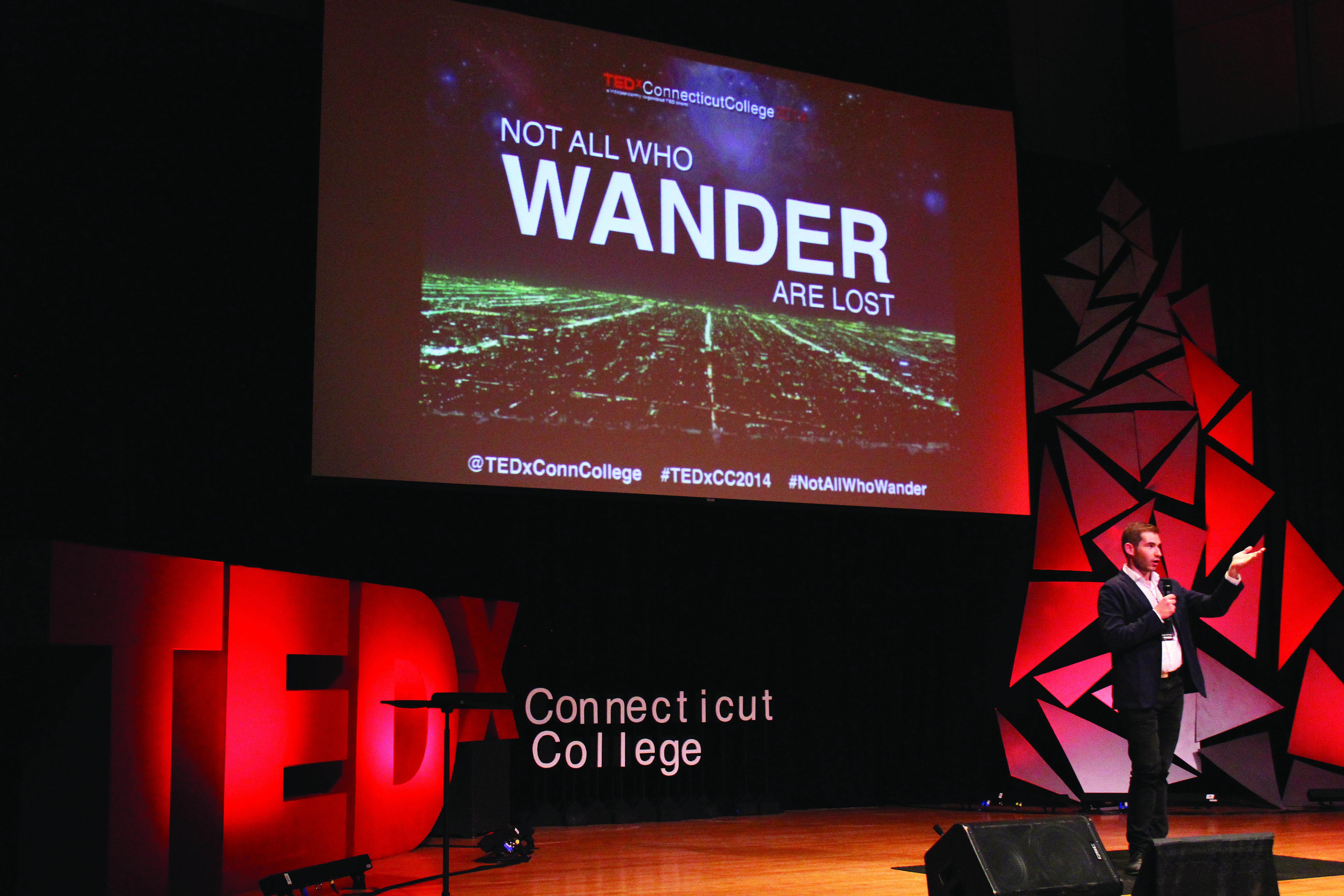“With a single Rubik’s cube there exists 43 quintillion different combinations [to solve the puzzle], but for over 300 million Americans, the media propagates very few ways in which to achieve success,” asserted Mia Hass-Goldberg ’16, addressing the attendees of the third annual TEDxConnecticutCollege Conference this past Saturday. However, the ideas, discoveries and life journeys shared at this year’s conference sought to open our eyes and imaginations to the plethora of ways to succeed and to measure this success.
This year’s theme, “Not All Who Wander Are Lost,” lent itself to several dichotomies of experience and wisdom. Theories on the value of wandering fell into two main camps: those who saw value in the destination and those who saw value in the path itself.
John Cohen ’83, the Principal Deputy Under Secretary for Intelligence and Analysis for the U.S. Department of Homeland Security, fell into the former category. Cohen had always been intrigued by how he would respond to “mortal danger, paralyzing fear and placing the good of the people over himself.” But he took an unconventional route to the place he is now. From a History major focusing on the role of women in American history to a street cop in Los Angeles to US Counterterrorism Coordinator, Cohen is a strongly believed that “the path you take is less important than the conclusion of your journey.”
Similarly, Priyanka Gupta ’06, Executive Director of MPIL Steel Structure Ltd. in India, presented innovative means to an end by describing the success of her family’s company through employing jugaad. Jugaad is the concept of an improvised solution to a problem when resources or scarce by doing more with less. Despite her strong urge to apply Western practices to her family business, Gupta realized that these were not feasible for her company and learned to embrace jugaad. By abandoning the path she thought she ought to take, Gupta helped lead her company to become one of the most successful, increasing sales by over 500% in her first three years on the job.
Yet, in contrast to those speakers who had a concrete goal regardless of the means to the end, there were many others who clearly placed priority on the journey. In his talk on underwater archeology, Robert Ballard reminded the audience, “Life is the act of becoming, you never arrive.” He described his life’s work as a series of evolutions, beginning with his hands diving explorations, to subsequent work with robotics equipment to map the ocean floor, to his educational programming to inspire the future generations of wanderers from “K to infinity and beyond.”
The second dichotomy of the conference was the actual act of wandering, physically and mentally. From Cason Crane hoisting the first LGBTQ flag atop Mt. Everest to Robert Ballard discovering the
remains of the RMS Titanic some 12,000+ feet below the sea, the speakers have certainly done their fair share of wandering across the globe.
But we were also reminded of the discoveries to be had by simply exploring the space around us. Mike Wipper ’17, encouraged everyone to engage in “urban exploration” by discovering the world around us. An avid photographer, Wipper is inspired by the abandoned building and man-made structures that have been abandoned.
Similarly Professor of Psychology Stuart Vyse recalled a childhood roaming unsupervised with the neighborhood kids catching snakes and dissecting unfortunate animals that had fallen to prey to the family cat. The highlight of these halcyon days was the construction of a small, rickety roller coaster in his back yard from scrap wood he and his friends collected. While Vyse did not grow up to become an architect (thankfully one might add, judging from the photos of the roller coaster), he attributed this freedom to explore as a child to the intellectual wandering he does now as an adult.
Vyse’s talk fused the importance of physical wandering and the need for intellectual wandering. With such structured childhoods and constant focus on education as just a stepping stone to a career, Vyse stressed that we don’t “call the mind to play” as much as we should. Professor of English Courtney Baker echoed this call in her talk on wandering through literature. When we wander through literature, said Baker, “we turn inward, we become better people – it is an exercise for the mind.”
TEDxConnecticutCollege itself is a tremendous example of the power of intellectual wandering. With 22 speakers, over 300+ people in attendance and live-streaming of the conference online, TEDx challenged all those who watched to step outside of themselves and consider the world beyond what we think we know. As Baker pointed out, “Wandering [the world] is a privilege. Marked by class, race, gender and sexuality, we need to think about who can wander and who can’t.” The discussion at TEDx, the conversations ignited by the videos and the ideas presented were a foray into wandering in which we can all be involved. •










